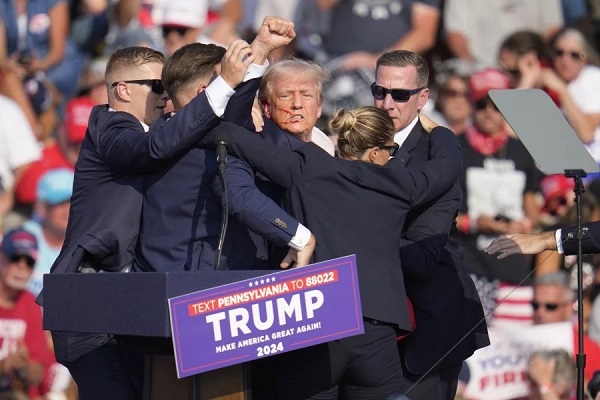Crime
Secret Service Tells Senators They ‘Identified’ Shooter Roughly 50 Mins Before Trump Took Rally Stage, Sources Say

 From the Daily Caller News Foundation
From the Daily Caller News Foundation
By NICK POPE
“I have no confidence in the leadership of Director Cheatle and believe it is in the best interest of our nation if she steps down from her position.”
The U.S. Secret Service (USSS) and the FBI told lawmakers Wednesday that former President Donald Trump’s would-be assassin was identified well before shots rang out at the Pennsylvania rally, according to sources familiar with the briefing.
Federal law enforcement held the briefing with lawmakers to go over specifics of the shooting that nearly killed Trump on Saturday in Butler, Pennsylvania. During the call, USSS and FBI officials stated that the gunman, later identified as Thomas Crooks, was noticed about an hour before the shooting, or approximately 50 minutes before Trump took the stage to address the crowd, according to two sources familiar with the briefing.
“There was zero accountability from Secret Service,” one source familiar with the briefing told the DCNF. “They identified the shooter 60 minutes prior to the assassination attempt.”
Given that the shooter opened fire about 60 minutes after being identified, and about ten minutes into Trump’s speech, this means that the identification occurred roughly 50 minutes before the former president took the stage.
Another source familiar with the briefing confirmed this particular detail to the DCNF. One of the sources said the officials told senators that Crooks was spotted with a range finder.
Both sources familiar with the briefing described it as a major disappointment given the gravity of the subject it addressed.
“Multiple members” who wanted to ask questions on the video call were not granted the opportunity to do so, according to another source familiar with the briefing. “They did not have answers to basic questions,” the source told the DCNF in reference to USSS and FBI.
USSS also spotted Crooks on the roof from which he opened fire about 20 minutes before shots rang out, according to ABC News, citing its own sources familiar with the briefing.
The security lapses that allowed Crooks to get several clean shots off at Trump from close range have raised serious questions from Republicans, who have widely and sharply criticized the USSS’ performance on Saturday as one of the worst failures in the agency’s history.
USSS Director Kimberly Cheatle has been lambasted for her response to the situation, which has included a statement to ABC News that security was not present on the roof from which Crooks opened fire because it is sloped.
Several lawmakers went public with their criticisms after the briefing as well.
“I just got off a briefing with the Secret Service and FBI. I am appalled to learn that the Secret Service knew about a threat prior to President Trump walking on stage,” Republican Tennessee Sen. Marsha Blackburn wrote in a Wednesday post to X. “I have no confidence in the leadership of Director Cheatle and believe it is in the best interest of our nation if she steps down from her position.”
Republican Utah Sen. Mike Lee expressed a similar view in his own post to X after the briefing.
“Secret Service Director Kimberly Cheatle needs to step down immediately. Today’s (mostly) information-free briefing only confirmed that,” Lee wrote. “What little information she gave us was at once deeply troubling and glaringly incomplete.”
Republican Sen. John Barrasso of Wyoming also ripped the Secret Service after the briefing concluded.
“This was a 100% cover-your-ass briefing. He was identified as being suspicious one hour before the shooting. He had a range finder and a backpack. The Secret Service lost sight of him,” Barrasso said in a statement shared on X. “No one has taken responsibility. No one has been held responsible. Someone has died. The President was almost killed. The head of the Secret Service needs to go.”
The FBI and USSS did not respond immediately to requests for comment.
Crime
Brown University shooter dead of apparent self-inflicted gunshot wound

From The Center Square
By
Rhode Island officials said the suspected gunman in the Brown University mass shooting has been found dead of an apparent self-inflicted gunshot wound, more than 50 miles away in a storage facility in southern New Hampshire.
The shooter was identified as Claudio Manuel Neves-Valente, a 48-year-old Brown student and Portuguese national. Neves-Valente was found dead with a satchel containing two firearms inside in the storage facility, authorities said.
“He took his own life tonight,” Providence police chief Oscar Perez said at a press conference, noting that local, state and federal law officials spent days poring over video evidence, license plate data and hundreds of investigative tips in pursuit of the suspect.
Perez credited cooperation between federal state and local law enforcement officials, as well as the Providence community, which he said provided the video evidence needed to help authorities crack the case.
“The community stepped up,” he said. “It was all about groundwork, public assistance, interviews with individuals, and good old fashioned policing.”
Rhode Island Attorney General Peter Neronha said the “person of interest” identified by private videos contacted authorities on Wednesday and provided information that led to his whereabouts.
“He blew the case right open, blew it open,” Neronha said. “That person led us to the car, which led us to the name, which led us to the photograph of that individual.”
“And that’s how these cases sometimes go,” he said. “You can feel like you’re not making a lot of progress. You can feel like you’re chasing leaves and they don’t work out. But the team keeps going.”
The discovery of the suspect’s body caps an intense six-day manhunt spanning several New England states, which put communities from Providence to southern New Hampshire on edge.
“We got him,” FBI special agent in charge for Boston Ted Docks said at Thursday night’s briefing. “Even though the suspect was found dead tonight our work is not done. There are many questions that need to be answered.”
He said the FBI deployed around 500 agents to assist local authorities in the investigation, in addition to offering a $50,000 reward. He says that officials are still looking into the suspect’s motive.
Two students were killed and nine others were injured in the Brown University shooting Saturday, which happened when an undetected gunman entered the Barus and Holley building on campus, where students were taking exams before the holiday break. Providence authorities briefly detained a person in the shooting earlier in the week, but then released them.
Investigators said they are also examining the possibility that the Brown case is connected to the killing of a Massachusetts Institute of Technology professor in his hometown.
An unidentified gunman shot MIT professor Nuno Loureiro multiple times inside his home in Brookline, about 50 miles north of Providence, according to authorities. He died at a local hospital on Tuesday.
Leah Foley, U.S. attorney for Massachusetts, was expected to hold a news briefing late Thursday night to discuss the connection with the MIT shooting.
Crime
Bondi Beach Survivor Says Cops Prevented Her From Fighting Back Against Terrorists


From the Daily Caller News Foundation
A woman who survived the Hanukkah terrorist attack at Bondi Beach in Australia said on Monday that police officers seemed less concerned about stopping the attack than they were about keeping her from fighting back.
A father and son of Pakistani descent opened fire on a Hanukkah celebration Sunday, killing at least 15 people and wounding 40, with one being slain on the scene by police and the other wounded and taken into custody. Vanessa Miller told Erin Molan about being separated from her three-year-old daughter during Monday’s episode of the “Erin Molan Show.”
“I tried to grab one of their guns,” Miller said. “Another one grabbed me and said ‘no.’ These men, these police officers, they know who I am. I hope they are hearing this. You are weak. You could have saved so many more people’s lives. They were just standing there, listening and watching this all happen, holding me back.”
Dear Readers:
As a nonprofit, we are dependent on the generosity of our readers.
Please consider making a small donation of any amount here.
Thank you!
WATCH:
“Two police officers,” Miller continued. “Where were the others? Not there. Nobody was there.”
New South Wales Minister of Police Yasmin Catley did not immediately respond to a request for comment from the Daily Caller News Foundation about Miller’s comments.
Australian Prime Minister Anthony Albanese vowed to enact further restrictions on guns in response to the attack at Bondi Beach, according to the Associated Press. The new restrictions would include a limit on how many firearms a person could own, more review of gun licenses, limiting the licenses to Australian citizens and “additional use of criminal intelligence” to determine if a license to own a firearm should be granted.
Sajid Akram, 50, and Naveed Akram, 24, reportedly went to the Philippines, where they received training prior to carrying out the Sunday attack, according to the Australian Broadcasting Corporation. Naveed Akram’s vehicle reportedly had homemade ISIS flags inside it.
Australia passed legislation that required owners of semi-automatic firearms and certain pump-action firearms to surrender them in a mandatory “buyback” following a 1996 mass shooting in Port Arthur, Tasmania, that killed 35 people and wounded 23 others. Despite the legislation, one of the gunmen who carried out the attack appeared to use a pump-action shotgun with an extended magazine.
-

 Energy1 day ago
Energy1 day agoThe Top News Stories That Shaped Canadian Energy in 2025 and Will Continue to Shape Canadian Energy in 2026
-

 Business2 days ago
Business2 days agoSome Of The Wackiest Things Featured In Rand Paul’s New Report Alleging $1,639,135,969,608 In Gov’t Waste
-

 International1 day ago
International1 day ago$2.6 million raised for man who wrestled shotgun from Bondi Beach terrorist
-

 Frontier Centre for Public Policy12 hours ago
Frontier Centre for Public Policy12 hours agoTent Cities Were Rare Five Years Ago. Now They’re Everywhere
-

 Alberta2 days ago
Alberta2 days agoOttawa-Alberta agreement may produce oligopoly in the oilsands
-

 Energy2 days ago
Energy2 days ago‘The electric story is over’
-

 Opinion13 hours ago
Opinion13 hours agoPope Leo XIV’s Christmas night homily
-

 Energy1 day ago
Energy1 day agoWestern Canada’s supply chain for Santa Claus




